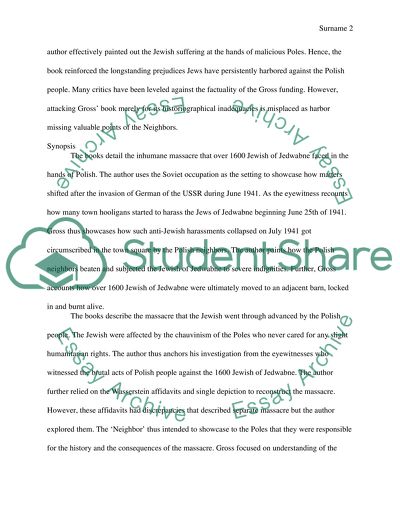Cite this document
(“Gross, Jan T. Neighbors: The Destruction of the Jewish Community in Book Report/Review”, n.d.)
Gross, Jan T. Neighbors: The Destruction of the Jewish Community in Book Report/Review. Retrieved from https://studentshare.org/history/1690888-gross-jan-t-neighbors-the-destruction-of-the-jewish-community-in-jedwabne-poland-princeton-nj-penguin-books-2001
Gross, Jan T. Neighbors: The Destruction of the Jewish Community in Book Report/Review. Retrieved from https://studentshare.org/history/1690888-gross-jan-t-neighbors-the-destruction-of-the-jewish-community-in-jedwabne-poland-princeton-nj-penguin-books-2001
(Gross, Jan T. Neighbors: The Destruction of the Jewish Community in Book Report/Review)
Gross, Jan T. Neighbors: The Destruction of the Jewish Community in Book Report/Review. https://studentshare.org/history/1690888-gross-jan-t-neighbors-the-destruction-of-the-jewish-community-in-jedwabne-poland-princeton-nj-penguin-books-2001.
Gross, Jan T. Neighbors: The Destruction of the Jewish Community in Book Report/Review. https://studentshare.org/history/1690888-gross-jan-t-neighbors-the-destruction-of-the-jewish-community-in-jedwabne-poland-princeton-nj-penguin-books-2001.
“Gross, Jan T. Neighbors: The Destruction of the Jewish Community in Book Report/Review”, n.d. https://studentshare.org/history/1690888-gross-jan-t-neighbors-the-destruction-of-the-jewish-community-in-jedwabne-poland-princeton-nj-penguin-books-2001.


